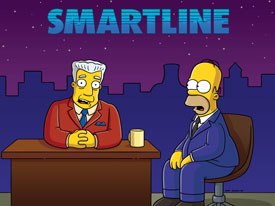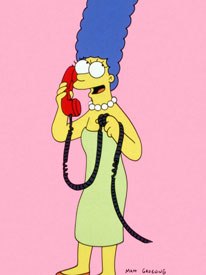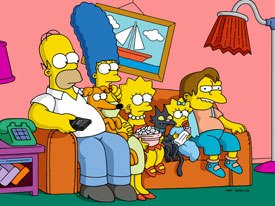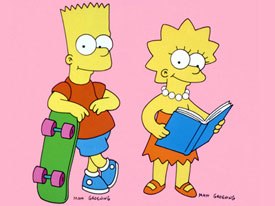As The Simpsons reaches its 400th episode, Joe Strike chronicles the rise of the longest running sitcom's rise from a symbol of the fall of Western society to a symbolic American icon.

Good ol' Homer Simpson. Due to circumstances too convoluted to explain quickly, this week he's driving the neighborhood ice-cream truck. Before selling his wares to the waiting children he presses a big red dashboard button labeled "Disclaimer" and a message plays: "Products contain neither ice nor cream; may contain trace elements of Mexican cheese. Do not consume."
Two commercial breaks later, a Pepsi-Cola commercial airs:Announcer: If we say 'when you rub a Diet Pepsi you get three wishes,' we have to run a disclaimer. [In a disclaimer voice:] Diet Pepsi is not a genie.
The outrageous disclaimer, completely negating what was said moments earlier is one of the dozens of recurring gags invented and exploited by The Simpsons with pitch-perfect precision. (When Krusty the Clown enthusiastically guarantees the flawlessness of one of his products, an announcer quickly adds, "not a guarantee.") Pepsi got the joke -- and stole it as well.
The Simpsons' influence is felt far and wide in the pop culture universe. After 18 seasons, it's no surprise that everyone knows Homer, Marge, their kids and Springfieldians (almost literally) innumerable. If Homer's adventures were taking place in real time, baby Maggie would be in college by now. However, as fictional cartoon characters Homer and company are spared the physical ravages of time -- and creatively, they seem to be holding up pretty well too. As of this writing the season-ending episode 400 is just a few days off (May 20, 2007, two episodes in a one-hour block 8-9:00 pm on FOX), a theatrical feature -- the only 2D one of 2007 -- is due out later this summer, and a 19th season is gearing up for the fall.
How does a show like The Simpsons stay crazy after all these years? How does it avoid taking a flying leap over that shark tank? (There are those who say it's already short a toe or two.) And what do others in the cartoon biz feel about the show that forever demolished the expression 'adult cartoon' as an oxymoron?

Mark Kirkland
Mark Kirkland has been part of The Simpsons since its second season. The director of 59 episodes, Kirkland has moved up to supervising director, overseeing the show's 10 or so helmers while still taking on the occasional episode himself. If anyone (outside of creator Matt Groening, James L. Brooks and Sam Simon, the show's original developers) knows how the Simpson family keeps going and going, it's him
Our show is parody of what we see in life. Life keeps changing and moving on. There's always new ideas for us to parody. We have a fabulous team of 25 writers. What I've seen over years is when a writer feels like he's done his thing, he moves on and creates a seat for a new one who's filled with new ideas. Sometimes we catch ourselves however. We have lots of story meetings, animatics and someone will say "didn't we do that?" and point out it was done five or 10 years ago.
We don't use a focus group -- we're our own focus group. We read what the [online] fans say, but fans aren't writing the shows. All the people working on the shows are also fans. We kind of create the show for ourselves.
FOX keeps hands off because we're kind of a grandfathered-in contract, because of the way the show was set up. James L. Brooks had the ability in that day. If the term is "600-pound gorilla," he's a thousand-pound gorilla, the strongest man in the business.
The characters have evolved, they have changed. The early Homers were different from where Homer is now. In the early years of the show I recall attending a lot of meetings where Matt Groening didn't want Homer as stupid.
Basically, if something's getting a laugh and is entertaining, we kind of keep things in that direction. Matt is still involved, James L. Brooks has been watching. About one or two years before the feature he started checking in with the episodes more. He had been really busy directing live action, but he started paying more attention, giving notes to the writers like, 'I want more stories that focus on the family.' James and Matt helped pull it back in line, they're the creators. They don't micromanage, but they do kind of guide where they want it to go.
Homer: I'll never wiggle my bare butt in public again.
Lisa: I'd like to believe that this time, I really would.
Episodes revolving around Homer and Lisa's up-and-down relationship are another staple of the series:
We've found those two such a good contrast for each other -- Lisa's intellectualism vs. Homer's dumbism play off each other so well that we do write a lot of stories around them -- you're gonna get one of those a year. It's kind of like Laurel and Hardy in that they complement and contrast each other so well.

Principal Skinner: I'd like to bid farewell to our students who are graduating, or going off to fight in Gulf War Five: Operation Find Our President's Head.
Kids: USA! Find the head! USA! Find the head!
Fantasy-premise episodes, once restricted to the annual 'Treehouse of Horror' show have become more common in recent years, as the writers seek to expand the show's canvas beyond the well-explored confines of its internal reality with fables and stories set in the future:
We usually do one or two a season, apart from the Halloween show. I love them personally, but they're challenging to do. On the artwork level, every design is a new design, which means a lot of research. The director and assistant director have to watch to make sure the design is consistent within the episode. We have our standard model sheets, everyone knows how to draw Homer. But when you have Homer as a Frenchman in the 18th century, then all eyes are on that model sheet.
There are three segments in those half-hours, and each segment is art directed differently. Those costume pieces are always a visual challenge, as are the effects. Last year we had ships tossed around at sea. It's amazing how the writers keep raising the bar for the directors and animators. They're more apt to say 'we can do anything, this is animation.' They'll challenge us to draw whatever they picture.

What I love about the show is the combination of the whimsical, there's an intellectual side to the show, and yet some of the funniest laughs we get are the low comedy laughs -- Homer running around with a plunger stuck on his head. It's funny in kind of a Three Stooges way, but it's The Three Stooges written by Bernard Shaw.
Lisa: Oedipus is the one who killed his father and married his mother.
Homer: Arrghh! Who paid for that wedding?
Lisa: At this rate, I'm gonna end up at Vassar.
Homer: I've had just about enough of this Vassar bashing, young lady!
There's intellectualness to our writing and we credit our writers. They're extremely intelligent. My intellect feels pretty small sitting in with our writers because they're so sharp. You go into our writing room and they're reading the Wall Street Journal or the New Yorker. They're just up on everything.
In addition to Hollywood actors and rock stars, celebrity authors (Michael Chabon, Tom Wolfe), artists (Jasper Johns) and even an architect (Frank Gehry) have lent their voices to The Simpsons; at this point, Hawking probably qualifies as a series regular.
The [celebrities] are approached. Somehow you find out so and so's a fan. What often happens, as in George Harrison's case, he did it because his son Dhani loves the show. A lot of times the celebrities do it because of their kids. It's become a roast, because if they sign up they know they're going to be made fun of, but it's a healthy fun.

We had a long-standing running joke that we hope they never do Jay Leno, because our characters don't really have big chins. And then they went ahead and did him, so they pulled it off somehow. It's a challenge -- sometimes we nail it right away, and sometimes we pass it from artist to artist, each taking a crack at it. Then we'll take a little from here, a little from there and ultimately it becomes that character.
Roger Meyers Jr. (producer of the 'Itchy and Scratchy' cartoons): That screwball Marge Simpson, we've got to stop her... but how?
Animator: Drop an anvil on her?
2nd Animator: Hit her on the head with a piano?
3rd Animator: Stuff her full of TNT and then throw a match down her?
The Simpsons Movie, due out in July, brings the family's adventures to the big screen. Producing the series and the movie simultaneously required a huge increase in production personnel:
It's been a challenge to do both at same time, that's why they gave me this position. We had to train a lot of new people. I went back to some of the same classrooms I studied in at Cal Arts and did some recruiting there. People have come in and we feel most people have risen to the challenge and done a good job.
We did a lot of recruiting last year. One of the cool things about The Simpsons is we're still doing drawings and flipping paper, we key pose the way the classic animation was done. We find that the young people who have studied animation, that's exactly what they want to do. There isn't a plethora of jobs out there doing that. We've become one of the old school places [Film Roman] that people want to come to. It's like you owned an electric guitar, and suddenly Unplugged became really popular; I think we're the Unplugged of animation.
I think the feature will do phenomenally well. What I love about it is it's a cartoon with characters the public loves. Everything else around it is CG. It's a big screen story and the artwork is fantastic. It's still The Simpsons but the artwork is magnified and the detail they put it in is just beautiful.
Marge: What on earth possessed you to get an earring?
Bart: Milhouse has one.
Marge: If Milhouse jumped off a cliff...
Bart: Milhouse jumped off a cliff?! I'm there!

I think if there weren't The Simpsons, there wouldn't be the whole bunch of primetime animation shows that are on now. How do we feel about it? It just means we're successful and we've been emulated. A lot of these shows are really original and we're fans of some of those shows -- or all of them. Sometimes I've thought wow, they really cross a line here, or gee, they're really making us look more G-rated all the time.
Bart: Hey dad, how come they're taking The Cosby Show off the air?
Homer: Because Mr. Cosby wanted to stop before the quality suffered.
Bart: Quality, schmality! If I had a TV show, I'd run that sucker into the ground!
Homer: Amen, boy. Amen.
We're still on TV for at least season 19, and I think all the artists want it to go on forever. Personally, I'd like to see us break the Gunsmoke record -- 20 seasons. We've already broken by far the longest-running animated series, then the longest running comedy series records. In animation, no surprise it was The Flintstones, which ran six seasons; we've gone triple that. The real surprise is the longest running comedy was Ozzie and Harriet. [The series ran from 1952-1966, but began on the radio in 1944.] A few years ago we bypassed that.

There's conjecture how FOX will promote the last season. That'll be decided on a very high level. You have to notice their strategy with some of the other shows like Family Guy and King of the Hill, they didn't give them a big fanfare goodbye. They went away, then the network decided to bring them back.
They left the door open, so that's another strategy. For FOX, The Simpsons is their Bugs Bunny, their Mickey Mouse. Why would Warner Bros. retire Bugs or Disney retire Mickey? Now Mickey does go kind of away until they decide it's time to bring him back; FOX has the opportunity to be using these characters for 50, 60 years.







